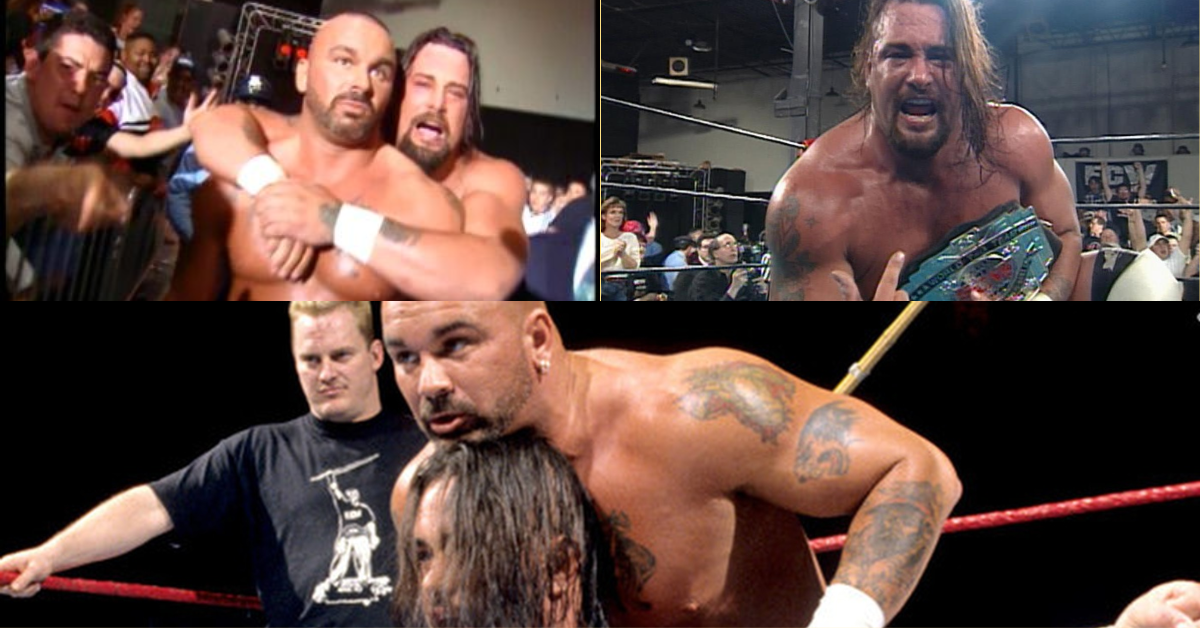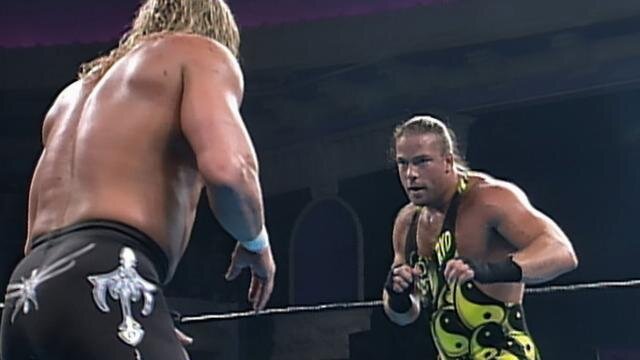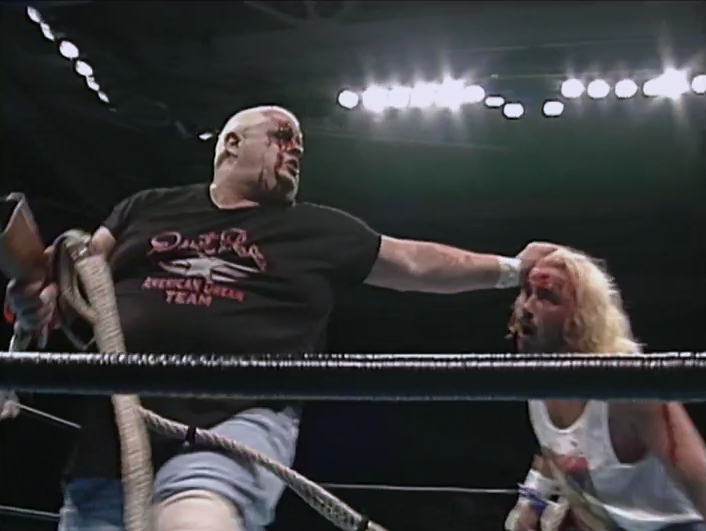Barely Legal: ECW's First PPV
The inaugural ECW Pay Per View was Barely Legal on April 13, 1997. With its origins in Joel Goodhart's Tri-State Wrestling, ECW would morph from Eastern Championship Wrestling to the more defined and shambolic Extreme Championship Wrestling. Barely Legal was a significant occurrence for the company and the entire wrestling business at the time. Most fans and insiders considered ECW the 3rd most pertinent promotion in North America in the 90s. The announcement of its first PPV seemed to indicate that ECW had arrived.
The Lead-Up
ECW was a regional promotion for the first few years and got mainly by on-tape trading and coverage in wrestling newsletters. I learned about ECW through magazines and later as a subscriber of PW Torch. Because of its excessive content and burgeoning pool of fringe talents, ECW created more intrigue for its product than most comparable promotions. As the wrestling war raged between WCW and WWE, ECW played a pivotal role in talent development and, later on, directly influenced WWE’S creative direction. They were a distant 3rd to the conglomerates in New York and Atlanta, but they were number 3.
Because ECW didn’t have a presence on cable or national television, many fans wanted to enjoy their content, but couldn’t. So instead of pursuing a TV deal, the next best thing seemed to be to explore PPV as an option. At that time, a woman named Elizabeth Tutt worked for a company called Premiere. She was an event manager, and her duties included all wrestling PPVs. She recalls ECW fans being the ones who were indeed responsible for the promotion getting its first PPV by writing hundreds of letters.
Many who worked for ECW, including some wrestlers, felt that the brand getting its own PPV would never happen. One of the founders and key figures in ECW’S history, Tod Gordon, felt strongly that the brand should not pursue a PPV event. This put him and the head of creative, Paul Heyman, at odds. Paul would eventually become the sole owner of ECW. Heyman felt that the only way for ECW to grow was to get on PPV. It turns out both he and Gordon were right.
Ironically enough, Tod Gordon announced in January of 1997 that Barely Legal would be held in the ECW arena in Philadelphia in April of that year. It was a historical moment in pro wrestling history, not to mention for ECW. While Premiere carried the event, some other providers declined. The one demand was that the rogue promotion would have to find someone with experience to shoot the event. The assignment ended up going to Michael Vettor, who would go on to work at every PPV the brand produced.
Before we get ahead of ourselves, though, we must back up a bit. Before the Barely Legal announcement, there was an incident that not only threatened to keep the company from ever being on PPV but destroying it entirely. That, of course, was what has come to be known as the “Mass Transit Incident.” In November of 1996, ECW was holding a show in Massachusetts. Axl Rotten, who was scheduled for a tag match, could not make the show. A local wrestler named Erich Kulas, AKA Mass Transit had volunteered to substitute for Rotten.
Erich Kulas told the company he was 23 when he was only 17 years old. Had the company known his age, Kulas wouldn’t have been allowed to work due to state laws. From the onset, Kulas had reportedly offended the other wrestlers in the match by suggesting spots for himself. One of those other wrestlers was New Jack, an unhinged and unpredictable wrestler who embodied the epitome of extreme. As was typically the case with ECW, there was to be blood featured in the match. Kulas, who had never bled in a match, unwisely asked New Jack to cut him.
New Jack quickly agreed and has since gone on record saying that he fully intended to cut Kulas as deeply as possible. That is precisely what he did, and he nearly killed Kulas in the process. When it was revealed that Kulas was a minor, it only exacerbated the situation. The ordeal placed a black cloud over ECW, which couldn’t have come at a worst time. It took great goodwill and effort to erase the stain of the Mass Transit incident, and it ultimately kept New Jack off of the PPV.
The Event
ECW benefited from Barely Legal being documented for the Beyond The Mat film. It featured behind-the-scenes footage that reinforced how momentous this occasion was for the promotion. We could see how effective of a leader Heyman was and how pivotal Terry Funk was to the brand. Due to a last-minute compromise, ECW agreed to a limited use of blood to have the show carried by Request. As a result, Barely Legal came across as slightly tame compared to typical ECW events.
There were two dark matches before the cameras rolled. Louie Spicolli defeated Balls Mahoney, and Chris Chetti and J.T. Smith turned back the challenge of The Full Blooded Italians. The first match to air was The Eliminators and The Dudley Boys for the ECW tag Team championship. Perry Saturn braved an injury to work the match, eventually getting the pin over Bubba Ray Dudley, who reportedly broke his ankle. It seemed like the right choice to get the crowd going and showcased two of the company’s top acts to first-time viewers.
Funny enough, the next match featured a last-minute addition who hadn’t been booked for the show until then. Arguably, the biggest star that ECW ever produced barely made it onto Barely Legal. Rob Van Dam defeated Lance Storm in ten minutes, giving everyone a glimpse of the future of ECW. The 3rd match would still be talked about to this day and was also a sign of things to come. ECW had established a working relationship with The Great Sasuke’s new promotion, Michinoku Pro.
The Japanese contingent seized the opportunity; some say they stole the show. Next up was Shane Douglas and Pitbull #2 for the ECW Television Championship. There was a lengthy backstory to this one, with Pitbull 2’s partner, Pitbull 1, being sidelined with a neck injury. The Pitbulls are a somewhat overlooked act in ECW lore, but they were a significant part of the promotion at its height. This match featured many shenanigans, with Pitbull 1, Chris Candido, and even Rick Rude getting involved. Douglas ultimately took the win.
In the most anticipated match of the night, after a solid build, Taz finally faced off with his arch-nemesis, Sabu. This was ECW’S version of Bret Hart and Shawn Michaels, as there was genuine animosity between these two. Sabu and Taz had a good match that played into both men’s personas and signature offense. Taz took the victory, and things culminated with a handshake between the foes, signifying their mutual respect. This match had a big fight feel and showed that ECW could deliver a proper payoff to long-term storytelling.
The premise for the main event would be a two-part act in a sense. Terry Funk, Stevie Richards, and The Sandman vied for an opportunity at Raven’s ECW Title. It would be what ECW would call a “three-way-dance,” the key difference from a triple threat match being that it was contested under elimination rules. Each man had a unique story to tell in an eclectic triumvirate of talent. Richards had done much of Raven’s bidding as his lackey, so it would have been an interesting dynamic if he were to win. Sandman had a longstanding rivalry with Raven, culminating in Raven turning his son against him. Terry Funk was the sentimental favorite though, the grizzled veteran looking for one last run.
Terry defeated Sandman and Richards en route to facing Raven for the World Title. The match was short and straightforward by ECW standards, with Funk going over on Raven in less than 8 minutes with a small package. Even better, the PPV would go off the air almost immediately after the 3 count, as Funk had gone into the crowd to celebrate. One of the main concerns of the night was not hitting the time cue, as the company had never been tasked with timing out a live event. When all was said and done, Barely Legal had come and gone, and by most standards, it was a success.
The Aftermath
It would be erroneous to say that Barely Legal was the beginning of the end for ECW, but the company would only last another four years. They eventually found themselves with a weekly television slot on TNN, one of the primary reasons the company folded. All things considered, ECW was a victim of the Monday Night Wars, a conflict that became so consuming that only one victor could emerge. By 2001, ECW officially ceased, and Paul Heyman took a job with WWE. The company that overachieved to a spectacular degree had come to a relatively quiet end.
Barely Legal will be remembered in many ways, like the recent All In, in 2018. It symbolized change and opportunity in the wrestling business. It was for the most impassioned wrestling fan, who followed the genre with such fervor that they became a vital part of the show. Few ever gave ECW a chance to make it onto PPV, yet they would go on to hold regular events until 2001. It’s a decent show immortalized by Beyond The Mat and its place in history. The 1990s were a magical and incomparable time in pro wrestling, and Barely Legal is a sterling example.



